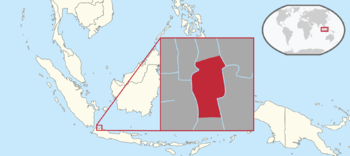Glodok
This article may require cleanup to meet MicroWiki's quality standards. |
This article contains too many red links, and may be going through a major copy edit. You can help by clicking on red links and creating articles or by removing unnecessary red links. |
Glodok City State 草埔城國 Chháu-po͘ Siâⁿ-kok Negara Kota Golodog | |
|---|---|
|
Flag | |
| Anthem: "No Victory Without Fighting" 爱拼才会赢 Ài-piàⁿ-chhím Hōe-iâⁿ | |
 | |
| Status | Disputed |
| Capital and largest city | Glodok (city-state) |
| Official languages | Chinese, Sundanese, English |
| Official scripts | Hàn-jī, Latin |
| Ethnic groups | 88.9% Chinese 9.1% Indonesians 2.3 others |
| Religion | 75% Buddhism 12% Christianity 10% Islam 10% others |
| Demonym(s) | Glodokan |
| Government | Unitary parliamentary republic |
| N/A | |
| N/A | |
| N/A | |
| Legislature | Parliament |
| Independence | |
• N/A | N/A |
| Area | |
• Total | 0.93 km2 (0.36 sq mi) |
| Population | |
• Census | 27,371 |
• Density | 10.39/km2 (26.9/sq mi) |
| Currency | Glodok dollar (GDD) |
| Time zone | UTC+7 (GST) |
| Driving side | left |
| Calling code | 62 |
| Internet TLD | .gd |
Glodok (Chinese: 草埔; pinyin: Cǎobù; Pe̍h-ōe-jī: Chháu-po͘; Sundanese: Golodog), officially Glodok City State (Chinese: 草埔; pinyin: Cǎobù Chéngguó; Pe̍h-ōe-jī: Chháu-po͘ Siâⁿ-kok; Sundanese: Negara Kota Golodog), is a enclaved sovereign city-state and microstate located within the city of Jakarta, completely surrounded by Indonesia.
Etymology
The word Glodok came from the Sundanese word "Golodog", meaning entrance to a house, as Sunda Kalapa (Jakarta) is the gateway to the ancient Sundanese Kingdom. It was also thought that the name came from the "grojok grojok" sound that water makes coming out of a waterspout in the yard of the City Hall (Stadhuis), now the Jakarta Museum. A waterspout was built on this site in 1743 and was used for daily needs such as a watering hole for horses.
The official name of the modern state is the "Glodok City State" (Chinese: 草埔; pinyin: Cǎobù Chéngguó; Pe̍h-ōe-jī: Chháu-po͘ Siâⁿ-kok; Sundanese: Negara Kota Golodog). The Chinese name of the city-state is 草埔 (pinyin: Cǎobù; Pe̍h-ōe-jī: Chháu-po͘).
History
Early
In Batavia (now Jakarta), Dutch East India Company created commercial opportunities which attracted immigrants from many areas of what is now Indonesia. This economic activity also lured thousands of Chinese people to Java. Swift immigration challenged the city's limited infrastructure and created burdens on the city. Tensions grew as the colonial government tried to restrict Chinese migration through deportations.
Glodok and Jakarta Riots
On 9 October 1740, 5,000 Chinese were massacred and the following year, Chinese inhabitants were ghettoized in Glodok outside the city walls. In 1998, Glodok was badly scarred during rioting. Because some "Pribumi" Indonesians accused Chinese Indonesians of hoarding the nation's wealth, and because of the large concentration of Chinese Indonesians residing there, Glodok suffered severe violence during the Jakarta Riots of May 1998.
Independence
Government and politics
Foreign relations and security
Geography
Climate
Economy
This section is empty. You can help by adding to it. (August 2022) |
Demographics
Languages
Religion
Transport
This section is empty. You can help by adding to it. (August 2022) |
